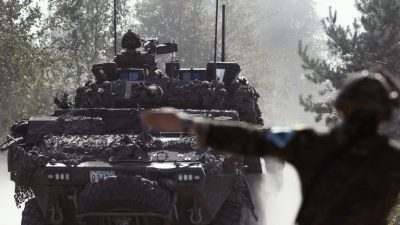Ottawa Must be Honest with Canadians About Troops in Ukraine
To help ensure the conflict doesn’t escalate even further we need to start asking tough questions of our political leaders

All Global Research articles can be read in 51 languages by activating the “Translate Website” drop down menu on the top banner of our home page (Desktop version).
To receive Global Research’s Daily Newsletter (selected articles), click here.
Follow us on Instagram and Twitter and subscribe to our Telegram Channel. Feel free to repost and share widely Global Research articles.
***
During a press conference last week, I interrupted Chrystia Freeland to ask whether Canada sent special forces to fight Russia in Ukraine. I also queried the deputy prime minister on whether Canada was at war with Russia and if she’s concerned about the possibility of nuclear war. I also asked if she considered NATO an aggressive alliance.
Before receiving a response, I was ushered out of the room at the Maison du développement durable in Montréal. But a reporter later asked Freeland about a New York Times report that Canadian special forces are working with US, British, Lithuanian and French counterparts in Ukraine. The elite troops are assisting Ukrainian forces with training and intelligence gathering. According to that article Canada’s secretive commandos are operating alongside a CIA mission to help coordinate US intelligence support for Ukraine’s war effort.
In her response, Freeland refused to confirm the deployment, instead focusing on the illegality of Russia’s actions. While most Canadians would agree with Freeland’s description of Russia’s horrendous invasion, we deserve to know if we are at war with a nuclear-armed state.
Today I asked Deputy PM @cafreeland whether she sent Canadian special forces to fight Russia in Ukraine. I also asked whether we are at war w/ Russia & if she's concerned about the possibility of nuclear war. Additionally, I asked if she thinks NATO is an aggressive alliance. pic.twitter.com/29z3aPdwDX
— Bianca Mugyenyi (@Bianca_Kabibi) June 29, 2022
Alongside special forces, Ottawa has encouraged retired soldiers to take up arms against the Russians. Hundreds of Canadians have been assisting the war effort, including former top generals Rick Hillier and Trevor Cadieu.
Ottawa has also delivered or allocated $600 million in heavy weaponry to repel Russian forces from the eastern region of Ukraine, known as the Donbas. Canadian assistance includes howitzers and light armoured vehicles as well as tens of thousands of artillery shells, grenades and rocket launchers. The Communications Security Establishment is also helping the military deliver the weapons into Ukraine and assisting with other operations in the region.
About 1,400 Canadian troops are currently stationed in eastern Europe as part of Operation Reassurance. Since 2017 Canada has led a NATO battlegroup on Russia’s doorstep, which is set to more than double in size to 5,000 personnel. Canada’s deployment to Latvia was recently extended, which may violate the 1997 NATO-Russia Founding Act’s prohibition on permanently stationing troops in former Warsaw Pact countries.
Last week two Canadian vessels left Halifax to participate in NATO missions in the Baltic and North Sea. They are joining two other Canadian warships patrolling near Russia’s territorial waters.
NATO is bolstering its operations in eastern Europe in response to a war partly spurred by the alliance’s enlargement. When NATO moved to expand eastward in contravention of promises made to Soviet officials, the architect of US containment strategy towards the Soviet Union, George Kennan, warned that it would “inflame the nationalistic, anti-Western and militaristic tendencies in Russian opinion.” In a 1997 New York Times op-ed Kennan predicted NATO expansion would “impel Russian foreign policy in directions decidedly not to our liking.”
Still, Ottawa pushed to expand the alliance, including Ukraine’s adhesion to NATO. In a 2008 cable to the secretary of state, the Moscow-based diplomat William Burns, who currently leads the CIA, wrote, “Ukrainian entry into NATO is the brightest of all redlines for the Russian elite (not just Putin).”
While not formally part of NATO, Ukraine has been drawn into the alliance since elected President Viktor Yanukovich, who legislated the country’s neutrality, was ousted with Western support in 2014. With Canadian soldiers leading the charge, NATO has trained and armed 10,000 Ukrainian troops annually over the past seven years. Canadian military trainers repeatedly said one of their aims was to pave the way for full Ukrainian participation in NATO by making its forces interoperable with the rest of the alliance.
Ottawa’s policies have aggravated tensions in eastern Europe. To help ensure the conflict doesn’t escalate even further we need to start asking tough questions of our political leaders.
At a minimum we should be told by our government if Canadian forces are on the ground in Ukraine.
*
Note to readers: Please click the share buttons above or below. Follow us on Instagram and Twitter and subscribe to our Telegram Channel. Feel free to repost and share widely Global Research articles.
Bianca Mugyenyi is an author, activist and director of the Canadian Foreign Policy Institute. She is based in Montréal.
Featured image: The NATO Enhanced Forward Presence Battle Group conducts an exercise in the Camp Ādaži training area in Latvia as part of Operation Reassurance, September 1, 2019. Photo by Corporal Djalma Vuong-De Ramos/DND.

